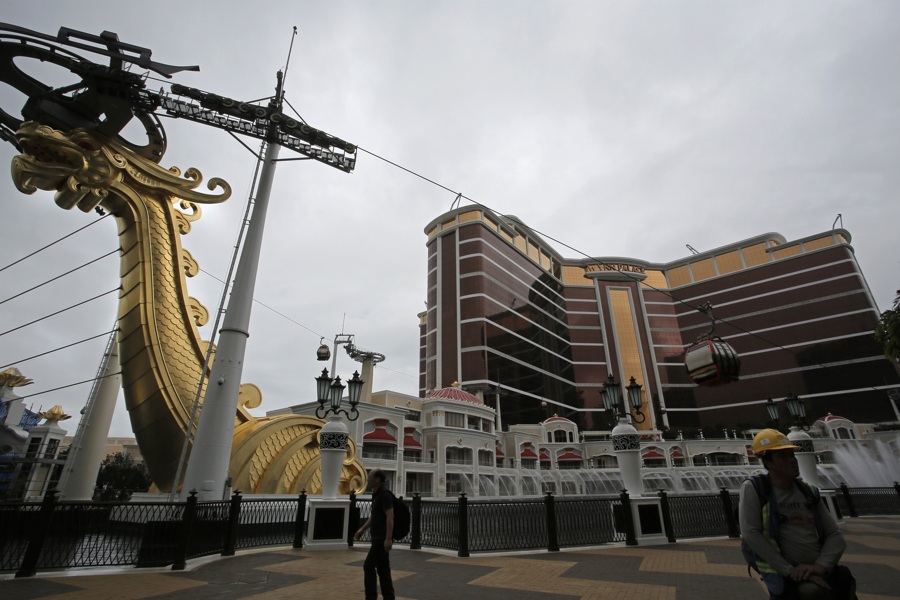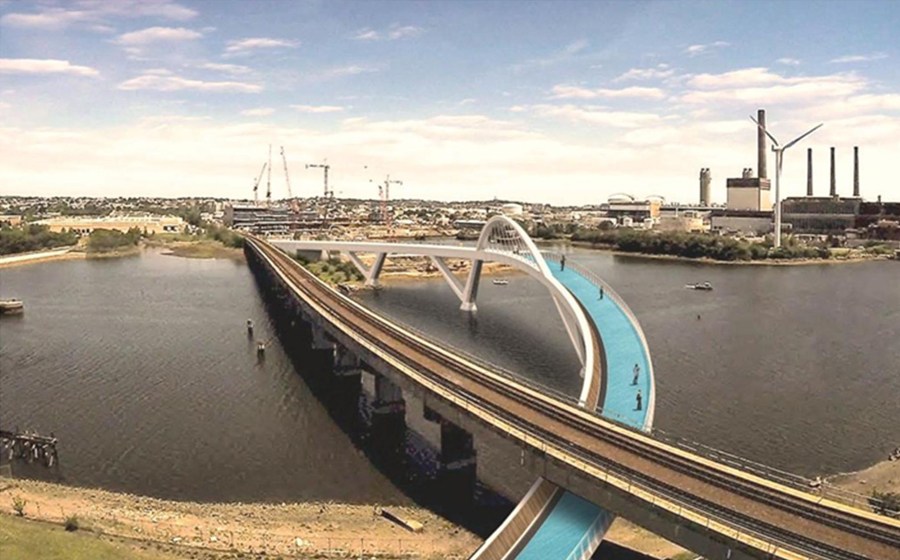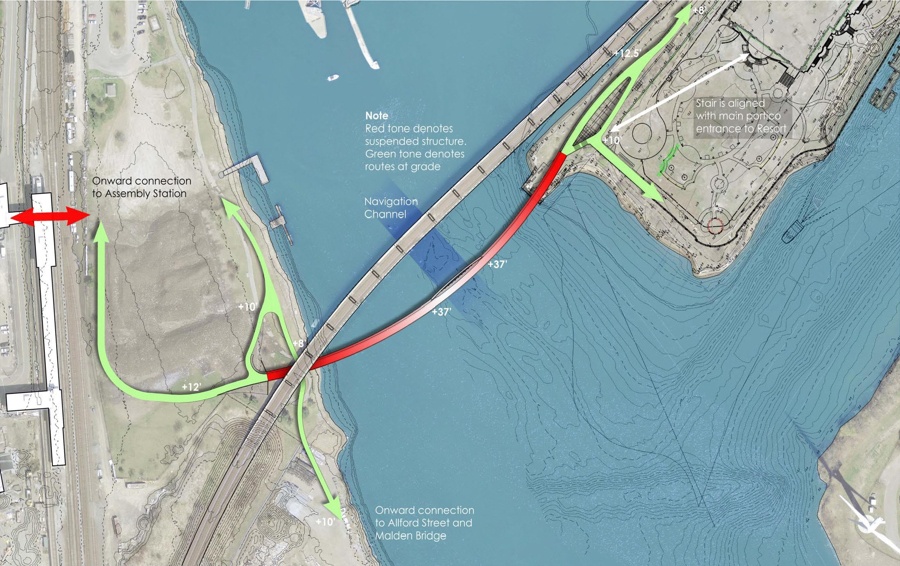Will We Fall for Gondolas Again?
The ultimate shiny object in transit is back, thanks to a plan for the Encore Boston Harbor Casino.

Wynn Resorts already operates a gondola system at its Wynn Palace casino resort in Macau, China. (AP Photo/Vincent Yu)
Picture this: You’re standing on the Somerville side of the Mystic, with money in your pocket and Lady Luck on your side, ready to head over to Encore to test the odds. You step aboard a sleek, shiny new gondola and float majestically over the city of Everett before landing softly at the casino—a quick, quirky jump from the Assembly MBTA stop over the Mystic River. How’d that feel? Good? Swell, because this is as close as you’ll probably ever get to riding the newly proposed vision for a gondola currently being pitched by Everett and Encore. Why, you ask, might this dreamiest of transportation projects remain just a dream? Because, simply put, gondolas aren’t the fix we like to think they are.
Boston’s last flirtation with suspended cable car transit was a lot of things: exciting, futuristic, and a waste of time. In 2018, developer Millennium Partners pitched a $100 million gondola system as way to circumvent gridlocked traffic in the Seaport and ferry its employees to the furthest reaches of the neighborhood. The idea was met with scoffs and was finally ditched for good last fall, as Bostonians—and even state officials, reportedly—dismissed it, arguing that it was a whimsical and unserious response to the city’s traffic problem that would only be accessible to Millennium employees and those willing to pay a premium. No buzzy idea can stay dead for long, though, which is why Everett is now seeking a $200,000 grant from gaming regulators to study the possibility of routing airborne cable cars from the Assembly Row T stop to the casino, then on to Everett City Hall.
We’re hardly the only city to fall under the alluring spell of the gondola in times of transit need. “[People] love to chase the new and technological things that are going to save us,” says Jarred Johnson, of TransitMatters. “It’s not just a Boston thing.” For instance, London—allegedly a city of sensible people with sensible public transit—built a gondola project over the Thames in 2012. Championed by then-mayor Boris Johnson and built ahead of the Olympics, the project famously went wildly over budget and is now viewed in the city not as a public transit godsend, but as an infrequently used tourist trap and money pit. Rio de Janeiro, another Olympic city, built a gondola system connecting a favela on a hard-to-get-to hillside with the rest of the city in 2011, only to close it five years later after the Games left town, citing a lack of funds for maintenance. It still hasn’t reopened.
While there admittedly are times when gondolas make sense, hopping over the Mystic River doesn’t necessarily seem like a natural fit. Typically, cities look to gondolas when they’re struggling to solve daunting topographical challenges, such as mountains or hilly urban areas. The Metrocable system in Medellín, Colombia, for instance, is widely cited as a gondola success story because it helped residents of the city’s poorer hillside neighborhoods cut their long and dangerous commute times in a way no other form of public transit could. And there’s a reason that gondolas are a staple of New England’s many ski destinations.
Conversely, crossing a river that’s maybe 1/8th of a mile wide ain’t exactly scaling a mountain, which is probably why Encore and Everett have spent the past three years planning a long-awaited and very sensible footbridge over the river. The bridge was meant to connect Everett residents to the subway and bike and pedestrian paths that run through Boston and the North Shore—something neighbors have long desired. Indeed, it’s an idea that makes so much sense that it was an all-but-agreed-upon plan, worked out between transit groups and Encore over years of community meetings and planning efforts. There’s even a preliminary design: an elegant white bridge that swoops under the existing commuter rail span. “The [bridge] project is a win-win,” says Amber Christoffersen, Greenways Director of the Mystic River Watershed Association, which has advocated for a bridge. “We had already gotten all the stakeholders to the table. It was a really unique overlap, where all the community groups and Encore were aligned.” According to Christoffersen, it was basically shovel-ready. Then the gondola scheme, which had been considered early on, rose from the dead.

Rendering of the proposed bridge via AECOM
So why are the casino and city reportedly considering ditching their plan for this fanciful amusement park ride? For starters, Encore claims a gondola is a cheaper, more efficient solution to how to get across the river: The casino’s operators believe a gondola would cost a lot less than what building a bridge might (according to internal figures, which they aren’t ready to share), and would eliminate hundreds of bus trips a year in for employees, according to Eric Kraus, its senior vice president for communications. Unlike the rejected Seaport gondola, it would be free, so everyone could use it. Kraus points to Wynn’s Skycab Cable Car at its hotel in Macao, which ferries passengers across a fountain-accented body of water, as an example of how they can be used effectively. “We’re a big fan of the pedestrian bridge,” Kraus says. “We just don’t have endless amounts of funds to do both of these ideas, and our primary concern is to transport our employees and guests to and from our facility. And for us right now, [a gondola] is a better option.” They may have a point. First-class fun is the Encore brand—it’s pretty much the reason we brought Wynn Resorts to Boston in the first place—and an attraction like gratis airborne rides over the Mystic doesn’t come along every day.
Still, transit activists aren’t in love with the idea, and it’s hard not to empathize with them for feeling a little burned by this potential change of plans. “If you’re interested in moving your wealthiest patrons seamlessly from your business to Assembly Row, a gondola might be the best solution,” says Stacy Thompson, of the Livable Streets Alliance. “But from the public’s perspective it’s not a good use of a public way.” Ditching the bridge, she says, would mean leaving a dead end for the long-planned Northern Strand bike path envisioned as a link for cyclists north of the city into Boston. What’s more, a gondola—even a free one—would operate exclusively at the discretion of Encore, which could decide at any time to stop running it or start charging for the privilege. A bridge, meanwhile, would be free forever and always. It’s hard to argue with a guarantee that’s literally written in concrete.
At the end of the day, though, the Encore is going to spend money getting people to its side of the Mystic one way or another. Access to the Orange Line is too tantalizing an opportunity to pass up. And who knows? Maybe they’re right and the gondola isn’t just the right fix, but the fun one, too. Or maybe we’re just getting too much caught up in the hype all over again, and down the line we’re going to wake up and realize this flashy but fraught solution wasn’t the best bet after all.


